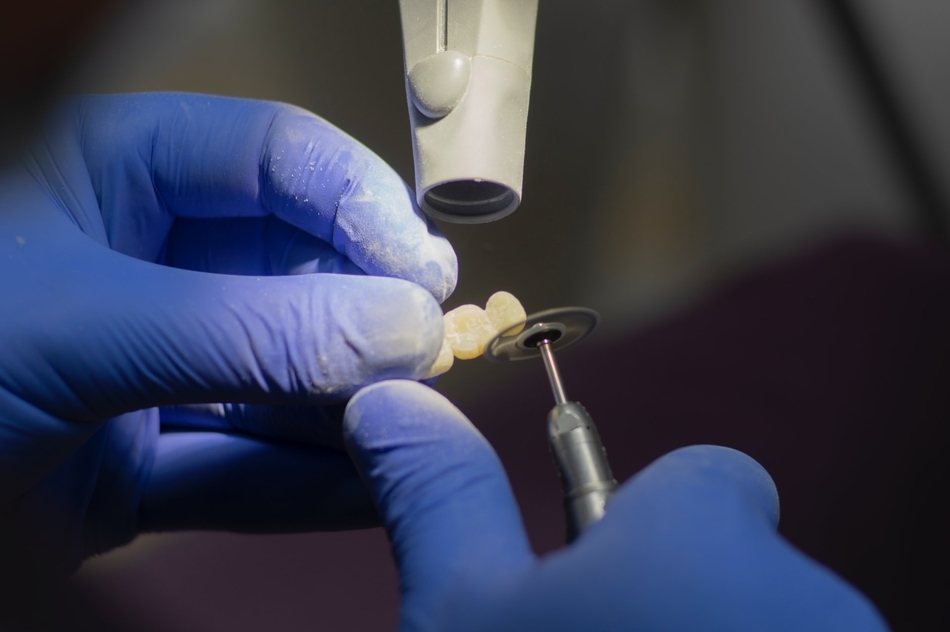
11 Jan How Do I Know I Need a Dental Crown?
You know when you need to floss and brush your teeth, but how do you know if you need a dental crown? If you’re visiting your dentist regularly for cleanings and checkups, then they’ll be sure to alert you, but how can you tell in between visits?
You may be able to tell that you may need a dental crown if you:
- Have a large cavity
- Have cracked tooth syndrome
- Get a root canal
- Have worn down teeth
There are many reasons why you may need a crown. While this list isn’t exhaustive, we cover some of the most common reasons why you may need one. Schedule an appointment with our dentists today to see if a dental crown is right for you.
Large Cavities
Cavities can be the result of many factors, though eating sugary, starchy foods and not maintaining proper oral hygiene are the usual culprits. Whatever leads to you needing a cavity filled, the result is always the same — tooth decay.
Tooth decay is the progressive process of when dental plaque is left untreated, leading to the development of tartar. Tartar can’t be removed by brushing alone, which means that you can’t clean under it. Over time it erodes the protective enamel of your teeth resulting in cavities.
Fillings are usually the solution for cavities. They are ideal for when your tooth hasn’t experienced major decay or any other problems resulting from the cavity. However, fillings may not be the best choice if a cavity has been left untreated for too long. This can require more extensive treatment and a dental crown may be your best option.
Crowns are significantly stronger than fillings, making them less likely to break due to regular wear. This also means that they’ll last much longer than fillings — possibly even years longer. Crowns are also more likely to stay in place than fillings since they go over the tooth rather than inside the cavity. A cavity may still grow even after being filled, making crowns the ideal solution in a more serious cavity situation.
Cavities are unable to heal on their own, and crowns are able to restore a tooth’s structural integrity while also protecting it from future damage. Even if you already have a metal filling, a cavity that takes up ⅔ the width of the filling can still benefit from a crown.
It’s important to discuss any concerns you may have about cavities with your dentist. Contact our office today to book an appointment with one of our dental professionals. They will be able to discuss your options more in-depth and develop a plan with you.
Cracked Tooth Syndrome
Cracked tooth syndrome is a dental problem in which fractures form inside the tooth and result in pain when you chew a certain way. This is because chewing puts stress on the fracture, causing you to feel as if the tooth is actually splitting apart when you chew.
Like cavities, multiple factors can lead to a cracked tooth:
- Applying too much pressure to the tooth
- Cavities weakening the strength of the tooth
- Chewing hard foods
- Suffering an injury that damages your tooth
- Sudden changes in temperature inside the mouth
- Teeth becoming weaker as you age
Regardless of the cause, the resulting pain can be difficult to live with. According to a study published by PubMed Central:
…crowns may be placed on the tooth to prevent separation of the crack during function. Upon review, following a period of 2–4 weeks after the application of immediate splint, the absence of pain has been described to indicate not only a correct diagnosis but also successful immobilization.
– PubMed Central
In other words, a crown can help diagnose cracked tooth syndrome as well as prevent fractures from becoming agitated. The result is teeth that are held in place, making chewing more comfortable and giving you peace of mind.
Get a Root Canal
You’ll need a root canal if the soft tissue at the root of the tooth, or pulp, becomes infected or inflamed. This can be due to problems such as deep decay of the tooth, multiple dental procedures, and chips or cracks in the tooth. Failure to seek treatment can result in pain or even abscesses.
After your visit to get a root canal, you’ll visit your dentist again so they can apply a crown to help protect the tooth and help it remain functional. This is necessary since teeth become weaker after a root canal and crowns help strengthen them. If a crown isn’t applied, you run the risk of your tooth crumbling due to lack of reinforcement.
The new crown also helps prevent recontamination which would require another root canal to fix it. Along with that, crowns help prevent any unwanted leakage from getting into the tooth, which could eventually require the tooth to be completely removed.
Worn Down Teeth
Healthy teeth should be strong enough to handle the wear and tear that we require of them. However, we also subject them to treatment they weren’t designed to handle. One of these is known as bruxism, which is a medical term for grinding your teeth and clenching your jaw.
If left untreated, this condition can lead to teeth that are:
- Worn down
- Cracked
- Loose
- Chipped
- Sensitive
Crowns are the perfect solution if you’re living with bruxism or another condition that wears down your teeth, such as acid reflux or an eating disorder such as bulimia. They can restore the natural shape of your teeth as well as restore a collapsed bite. You may still need to wear a mouthguard at night to help protect your crowns from being ground down when you sleep.
Do you suspect that you need a crown for a dental problem you’re experiencing? Contact us today to schedule an appointment and discuss your options with one of your dentists!
Augusta Family Dental has two convenient locations to better serve you. You can contact our Augusta office by calling (706) 863-4567, or schedule an appointment online. You can schedule an appointment with our Hephzibah office by calling (706) 793-3600.

Sorry, the comment form is closed at this time.